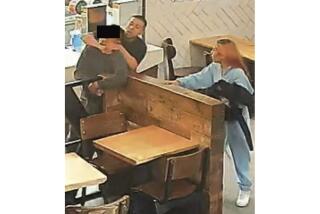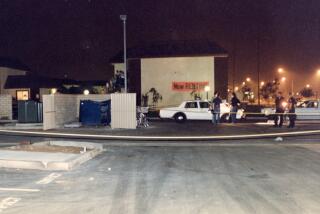Avila Pleads Innocent in Killing
A Lake Elsinore man pleaded innocent Friday to kidnapping, molesting and strangling 5-year-old Samantha Runnion last month as questions mounted over whether he could receive a fair trial in Orange County.
Alejandro Avila’s attorney said she was surprised that Dist. Atty. Tony Rackauckas showed up at the arraignment to personally argue the state’s case. The unusual move came as Rackauckas made the rounds of national talk shows this week after announcing Monday he would seek the death penalty.
“I have a concern in this case that the media attention could distort the process,” said Assistant Public Defender Denise Gragg, comparing the intense coverage to that surrounding the O.J. Simpson case. “It’s causing a rush to judgment.”
Gragg complained that the news media seems to know more about the evidence in the case than she does, citing DNA tests, fiber samples and cell-phone records that law enforcement sources have said link Avila to Samantha’s murder. Even President Bush has labeled Avila as the “killer of Samantha.”
Gragg raised the possibility that she would seek a change of venue if she concludes that Avila cannot get a fair trial in Orange County. Rackauckas said he believes Avila can receive a fair trial. The district attorney will likely oppose efforts for a change of venue, he said.
Other high-profile child murder cases--including the trial of Polly Klaas’ accused killer--were moved because of pre-trial publicity. But others, like the Danielle Van Dam case in San Diego--were not. Scholars said Friday the Avila case could go either way but agreed there were strong arguments for a change of venue.
Laurie Levinson, a law professor at Loyola University, said Orange County’s judicial district is large enough to find jurors who might not be influenced by pretrial publicity. She said the case shares a lot of elements with the Van Dam case, including the level of coverage and the community’s emotional involvement.
What sets the Avila case apart from the Van Dam case is that so many high-ranking officials have publicly declared the defendant guilty before his case goes to trial. The day Avila was arrested, for example, Sheriff Michael S. Carona said he was “100%” sure Avila was Samantha’s murderer.
“It was probably not too helpful to keeping the case in the community when the leadership comes out and says he’s 100% guilty,” Levinson said. “If I had to bet, it’s the kind of case where it would not surprise me to see a change of venue.”
Gerald Uelmen, law professor at Santa Clara University School of Law, agreed. He said the public declarations of Avila’s guilt have been unusually damning. Uelmen also said it was unusual for prosecutors to seal affidavits supporting the search of Avila’s apartment and his arrest.
“I’m not sure what justification they have to keep it sealed ... ,” Uelmen said. “I would think the defense would have access to it before the preliminary hearing.”
Samantha was playing with a friend near a row of garages at her Stanton condo complex on July 15 when she was grabbed and forced into a car by a stranger who asked for help finding his lost puppy.
Avila, 27, was arrested four days later and charged with kidnapping, murder and two counts of lewd acts upon a child. Special circumstances filed along with the charges allow prosecutors to seek the death penalty.
Avila professed his innocence in an interview with The Times hours before his arrest, saying he was at the Ontario Mills mall around the time of the crime. But law enforcement sources say they have collected evidence that contradicts his alibi, including preliminary DNA test results and cell-phone and credit-card records that place him near the area where Samantha was found dead.
At his arraignment Friday, Avila peered through a glass partition as Gragg entered his plea.
Shackled at his waist, Avila spoke only once during his arraignment, answering “yes” when Orange County Superior Court Judge Ronald P. Kreber asked if he agreed to a delay of his preliminary hearing.
Kreber put off the preliminary hearing, which is held to determine if there is enough evidence to bring Avila to trial, after Gragg complained that prosecutors had not turned over key evidence that, according to various press reports, they have collected against Avila.
Rackauckas countered that his office will be giving the defense 2,000 more pages of evidence in the next couple of days, and handing over even more in the next few weeks.
He urged that delays for the sake of delays not be made.
More to Read
Sign up for Essential California
The most important California stories and recommendations in your inbox every morning.
You may occasionally receive promotional content from the Los Angeles Times.










